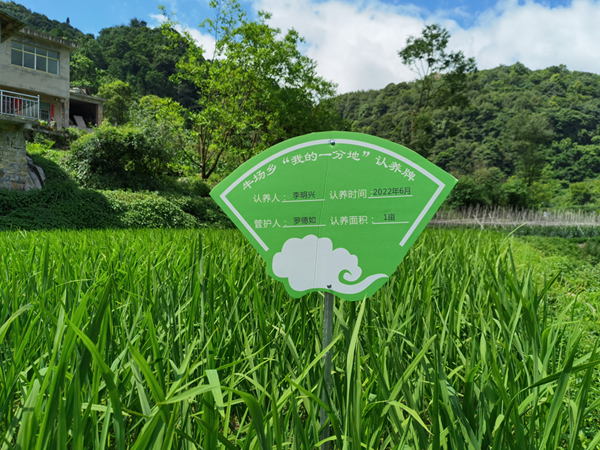'Farmland adoption' harvests wealth, joy for rural, urban participants
 0 Comment(s)
0 Comment(s) Print
Print E-mail Xinhua, August 8, 2022
E-mail Xinhua, August 8, 2022

Verdant rice paddies looked all the more vibrant under the blistering summer sun. For Luo Deru, owner of the fields in southwest China's Guizhou Province, a bumper harvest was already in sight.
The 59-year-old farmer's expectation for the upcoming autumn was boosted by a "farmland adoption" program that is expected to bring his family more income.
Launched in early June in the provincial capital Guiyang, the program invited urbanites to "adopt" a piece of farmland in Wayao Village on the outskirt of the city to have a taste of idyllic farming life as well as food grown by themselves.
After signing a contract with an adopter, Luo rented out one mu (about 0.07 hectares) of red rice fields. After the harvest, the adopter will purchase the rice at the rented field, at the price of 20 yuan (2.96 U.S. dollars) per kg.
"Red rice was not easy to sell. In the past, most of the harvest was consumed by my own family," said Luo.
Wayao Village has a registered population of around 600. One-third of them have become migrant workers in cities, leaving the village with many elderly people and children.
Local officials tried several ways to increase people's income, such as developing vegetable plantations, a few years ago. However, the community was not able to market itself well.
"The program offered us solid market channels. Farmers are now more motivated," said Wang Zhenghua, Party secretary of Wayao Village.
According to Wang, 28 households in the village have joined the program so far, with the rented farmland area totaling about four hectares.
As written in the adoption contracts, adopters, in the forms of individuals, families or groups, can experience farming activities such as sowing, fertilizing, watering and harvesting on the adopted field, while the "landlords" provide guidance and farming necessities such as organic fertilizer and agricultural machinery.
"We strictly follow a standardized, pollution-free way of planting to ensure the quality of our agricultural products," said Wang.
In the eyes of Cen Yue, Party secretary of Niuchang Buyi Ethnic Township which administers Wayao Village, the village boasts advantages in location and environment, but scattered farmland and an aging population have hampered local development.
"To develop agriculture, we must focus on solving the following issues -- who will farm, what to plant, and how to manage the farmland," said Cen.
The farmland adoption program targets these problems. Visitors from the cities have brought back a long-lost boisterous ambiance to the village, especially on weekends and holidays.
Luo Xiaogang is among the first group of farmland adopters. For the doctor working in Guiyang for over 20 years, village life in Wayao is refreshing and rewarding.
"I often came here with my family to take care of my field and learned how to transplant rice seedlings. We feel so relaxed being close to nature," he said, adding that he has also tried some newly developed rural recreations in the village such as fishing, camping and picking berries.
According to Cen, local authorities are pooling wisdom to further improve people's experience in the adoption program, so as to attract more participants and draw investments for local development.
Luo, the doctor, said the program is not a one-way charity but yields mutual benefits for rural and urban participants.
"The program is quite meaningful for bolstering rural vitalization," he said. "I will introduce it to my colleagues and I believe they will be interested in joining in."





